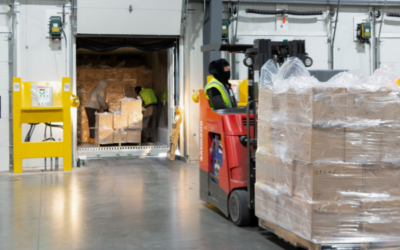Cross docking is a short term cold storage warehouse solution for products that quickly move in and out of frozen and refrigerated warehouses. Pre-tagged palletized products get transported to the cross dock facility, which then gets consolidated with other orders and sorted onto trucks to be shipped to various retail, warehouse, and distribution locations nationwide.
Cross Docking is great for frozen and refrigerated food and beverage manufacturers that do not require an inventory but want to benefit from the economies of scale that consolidation offers. A typical cross dock can turn inventory within 48 hours, reducing lead times and ensuring the dated product deliver within code. Having a trusted cross docking warehouse partner like RLS Logistics with less than truckload shipping services with a firm delivery schedule to all 48 states helps move products through the cold chain quickly and efficiently. RLS Logistics has a temperature controlled cross dock warehouse in Newfield, NJ, near the metropolitan areas of Philadelphia, PA and New York City, NY. From this facility, RLS services all 48 states with refrigerated and frozen LTL consolidation programs.
Customers can get involved in our cross docking program in three ways: drop pre tagged product off at the Newfield, NJ cross dock facility, schedule a pickup with RLS Logistics from anywhere in the country, or maintain an inventory at one of RLS Logistics’ cold chain storage locations which further reduces costs for the customers as a fully integrated solution.
Advantages of Utilizing a Cross Docking Facility:
- Reduce storage space and inventory costs.
- Reduce touch points and material handling that is associated with traditional long term warehouse storage.
- Quality control and reinspection on the cross dock reduce product damage and misships.
- Reduce lead time with a cross dock strategically placed near retailers and distribution centers.
- Reduce transportation costs by consolidating a smaller shipment with others going to the same location, only paying for the space you use on the truck.
- Day specific delivery programs to Walmart, Publix, and select C&S distribution centers.
RLS Logistics handles a variety of food grade commodities through the cross dock, including a refrigerated and frozen Walmart pool consolidation program. The refrigerated trucks run at 34 to 38 degrees Fahrenheit, perfect for transporting dairy products such as yogurt, cheese, milk, and more. The frozen trucks run at 0 degrees Fahrenheit; some examples of frozen commodities RLS services are frozen seafood, frozen meat, frozen pizza, frozen vegetables, and frozen fruit. With regional pickup services in the North East, RLS Logistics provides a fully integrated less than truckload consolidation program for frozen and refrigerated food manufacturers nationwide.
Find out how RLS Logistics can help your frozen and refrigerated supply chain succeed by consistently and safely delivering your products on time and in full. Reach out to our Cold Chain Experts at 800.579.9900 for a no obligation call today.
ABOUT RLS LOGISTICS: Headquartered in Glassboro, NJ, RLS Logistics is a family-owned, third-party logistics provider specializing in value-added cold chain solutions, including LTL and FTL transportation, cold storage warehousing, and direct-to-consumer fulfillment. Founded in 1968, the company has been owned and managed by the Leo family for over 50 years and has grown into a leading integrated cold chain 3PL. For more information, visit https://www.rlslogistics.com/.




